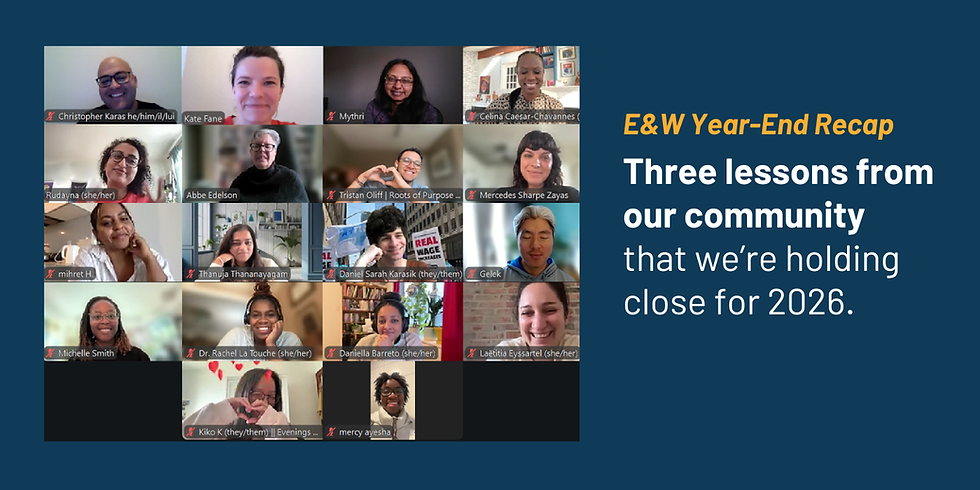Now Open! Public Workshops for Liberatory Workplaces
- Evenings and Weekends

- Feb 6, 2024
- 4 min read
Updated: Feb 11, 2025

You’re invited! This spring, Evenings & Weekends Consulting is hosting a series of online workshops to help the nonprofit sector create more liberatory working environments.
They're designed for anyone who's excited to build better organizations—senior leaders, staff, and volunteers—and will offer informative strategies and interactive activities for a maximum of 50 participants.
Join us every other Thursday from 12-2pm ET to take part!

Nurturing Psychological Safety for Thriving Teams
In this immersive experience, participants will explore the key elements of creating a psychologically safe workplace, fostering an environment where every team member feels valued, heard, and empowered. Through engaging activities, insightful discussions, and practical strategies, attendees will gain the tools to cultivate trust, open communication, and mutual respect within their teams. Elevate your team dynamics, boost collaboration, and unlock the full potential of your workforce by embracing the principles of psychological safety.
Facilitator: Thanuja Thananayagam, she/her
Thanuja is a Sri Lankan-born antiracism practitioner with over two decades of dedicated experience in holistic human resources. She is a seasoned professional expert in various facets of the field and her journey encompasses talent acquisition, talent management, equity, diversity, and inclusion, all centered around cultivating an environment where every individual feels a sense of belonging. Thanuja's passion for fostering inclusivity and fairness has led her to become a prominent advocate for equity and diversity, consistently driving initiatives that bridge gaps and promote understanding.Beyond her HR expertise, Thanuja holds an MBA and MEd and currently pursuing her Ph.D. She is a devoted antiracism researcher presently engaged in the research phase of her Ph.D., further exemplifying her commitment to dismantling systemic prejudices and generating knowledge that fosters meaningful change. As a mental health advocate, she’s a board member of GenWell Project, a not-for-profit organization dedicated to promoting human connection.

Disability and Racial Justice: What Can They Teach Us About Liberation?
Through interactive discussions, and engaging activities, participants will examine the shared experiences and challenges faced by individuals at the intersection of disability and race.We will explore the ways in which systemic oppression, ableism, and racism perpetuate inequalities and hinder progress towards anti-oppressive workspaces, and develop a toolkit for fostering liberation and creating inclusive spaces.
Facilitator: Rosy Douge-Charles, she/they
Rosy, an educator, activist, and consultant, has a rich background in teaching at Algonquin College in Ottawa and George Brown College in Toronto. Currently residing on unseeded and unsurrendered Algonquin Territory (Ottawa, ON), they are interested in the intersections of racial, food, disability and gender justice. With experience in various community centers across Ottawa, Montreal, Toronto, and New York, Rosy possesses a deep understanding of how anti-Black racism manifests in Canada and across borders. They are passionate about shedding light on the systemic persecutions affecting Black lives, including the carceral system, education, health, art, parenthood, environmental degradation, and disability justice. Rosy holds a degree in Women's and Gender Studies from the University of Ottawa and has roots in Montreal, Brooklyn, New York, and her ancestral land of Haiti. Please remember to use a mix of she/they pronouns when referring to Rosy to respect them and the way they navigate the world.

Confronting White Supremacy
Through individual reflection and intention-setting, small group discussions and interactive exercises, participants will explore how white supremacy culture presents and is upheld in their workplace, and navigate antidotes to those characteristics to actively work towards dismantling it. Consideration has been given for how BIPOC colleagues will interact with this workshop safely and with impact.
Facilitator: Mojdeh Cox, she/her
Mojdeh is an impact and results oriented community builder and leader. For nearly 15 years, Mojdeh has coached organizational leaders and consulted with institutions across all sectors seeking to heighten their equity lens and carry the principles of justice, equity, inclusion and belonging into all elements of their business operations. She is an award-winning facilitator and learning and development designer, inspired by the popular education model to mobilize knowledge through an anti-oppression lens. Mojdeh believes that a supportive, inspiring organizational culture where there are shared values and goals is how cross-functional teams in complex systems thrive. Mojdeh has expertise in labour relations, change management, government relations, and issue-based campaigns and advocacy. Most recently, her thought leadership on radical accountability has been nationally recognized in her tenure as President and CEO of Pillar Nonprofit Network.

Words Matter: Inclusive Communications for Dismantling Anti-Black Racism in the Workplace
Who doesn’t want to feel like they belong at work? The language we use in our communications can either exclude or include employees or clients—but that’s only the start of creating workplaces where people belong. Using performative language in communications aren’t enough. Taking a critical look at how we communicate, Shellene gives lovers of language the tools to create communications that respect all people in the workplace.
Facilitator: Shellene Drakes-Tull, she/her
Shellene is a writer, communications strategist, and educator. Helping people connect and engage through storytelling has always been a passion for her. For all of us, answering the question, ‘who are you?’ is integral to creating your story and standing confidently in your truth. Shellene is a contributing columnist at the Toronto Star and a freelance journalist who has shared the stories of diversity, equity, and inclusion at the Globe and Mail, Toronto District School Board, Deloitte, and others. She is a sessional lecturer and the creator and instructor of the Modern-Day Griot Project at the University of Toronto’s Scarborough campus teaching about the stories of Black Canadians to change the narrative of Blackness in Canada.




Comments